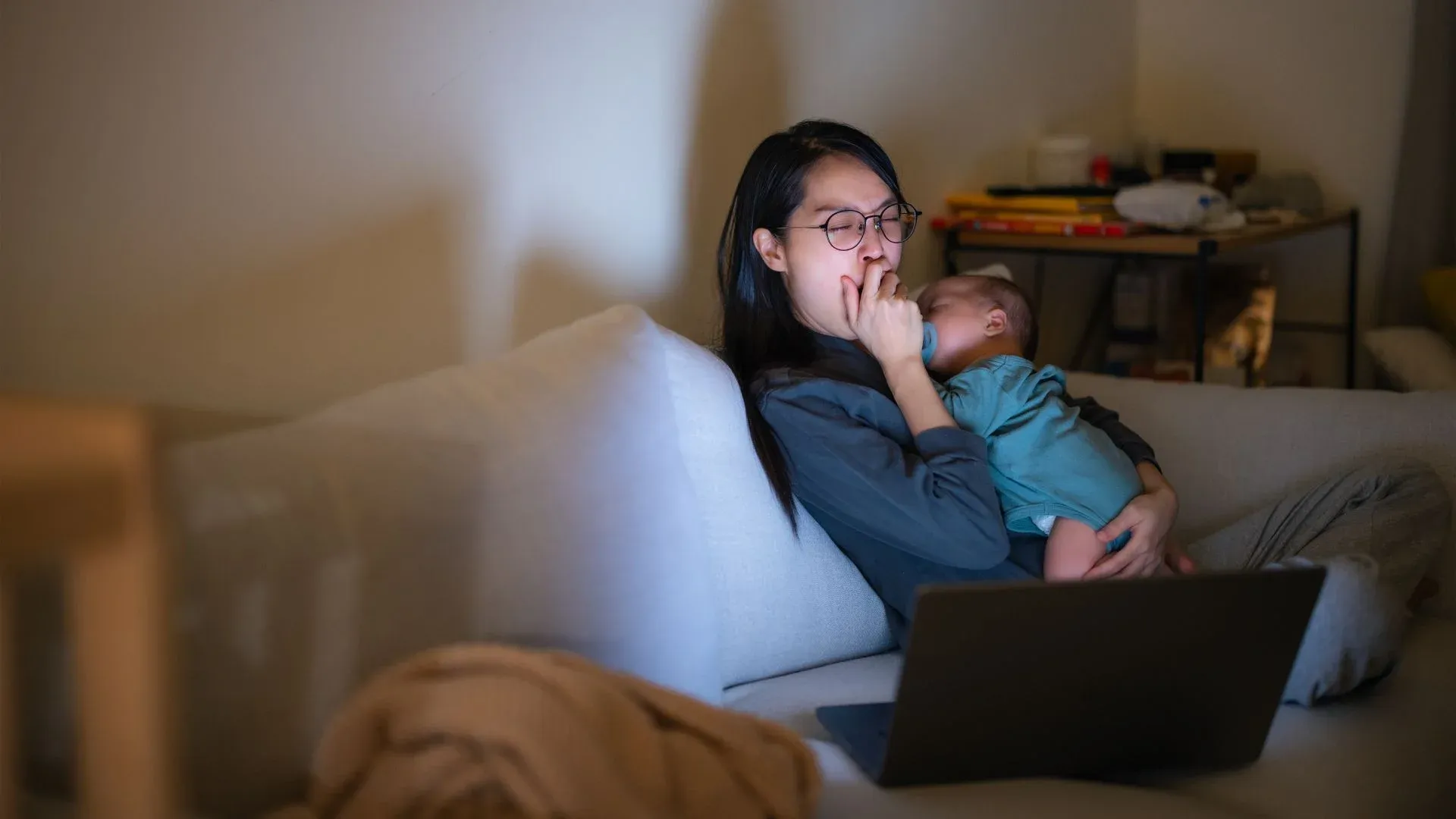How to Get Better Sleep; Helping Sleep-Deprived Moms
Ana Marie Schick: Resident Sleep Expert and Certified Health Coach • Sep 01, 2022

Key Takeaways
Sleep deprivation is common for new moms, but small adjustments and the right support can help improve rest and recovery.
- Night feedings, hormonal shifts, and daily stress make sleep deprivation a frequent challenge for new mothers.
- Ongoing lack of sleep can affect mood, memory, immune health, and overall well-being.
- Simple strategies like sharing nighttime duties, taking short naps, and creating a sleep-friendly space can help improve rest.
- Sleep-support tools such as white noise machines, blackout curtains, and cooling systems like the Chilipad can support more consistent sleep.
- Prioritizing rest is essential for both maternal health and the care of a newborn—not a luxury.
Being a mom is one of the most rewarding jobs in the world but also the most demanding and exhausting. From late-night feedings to early morning drop-offs, it’s easy to see why sleep deprivation is a common problem among new moms or a mother of grown children, you’re on-call, 24/7, and it can be pretty darn exhausting!
The Centers for Disease Control (CDC) has reported on the widespread problem of sleep deprivation for new moms in the United States. For single moms who are “only” parents as well, Mother’s Day can often feel like just another reminder of the incredible uphill battle faced every day.
Indeed, single mothers are the most sleep-deprived people in the country, according to CDC data. [1] Guess who came in second place? Moms from “nuclear” households with a partner are the second-most sleep deprived.
The irony is that while getting adequate sleep is crucial for our health and well-being, it can feel unattainable to achieve as a busy mom.
Below, we’ll discuss some practical tips and tricks for sleep-deprived moms to get better sleep. From setting a time to take a nap, creating a relaxing bedtime routine, and other helpful tips that any mom can do leading up to bedtime that can help improve their sleep quality and quantity.
What is Sleep Deprivation
Sleep deprivation is a condition where an individual does not get enough sleep or has poor-quality sleep, leading to physical and mental health problems.
It can be acute, lasting a few days, or chronic, persisting for several weeks or months. It can affect anyone, regardless of age, and can have severe consequences on daily life, work, and overall health.
The Effects of Insufficient Sleep
- Insufficient sleep can have far-reaching effects on the body and brain. Some of the effects of sleep deprivation include:
- Impaired cognitive function, including attention, memory, and decision-making
- Mood disturbances, such as irritability, anxiety, and depression
- Increased risk of chronic diseases, including diabetes, high blood pressure, and cardiovascular disease
- Weakened immune system, making it harder to fight off infections
- Premature aging and reduced life expectancy
- Increased risk of accidents and injuries, particularly in the workplace or while driving
Control Your Sleep Temperature
Ready to say goodbye to restless nights? Discover how Chilipad's temperature control can help you sleep more soundly and wake up energized, even on the busiest days.
How to Overcome Sleep Deprivation
If the CDC wants us to prioritize sleep deprivation as a national health priority, the first people who deserve better sleep are moms. Below are a few tips on how sleep-deprived moms can improve their sleep quality over time.
Practice Good Sleep Hygiene for Moms
Let’s start with the obvious: moms have no downtime! It might feel impossible to prioritize sleep but it’s a very important step.
A tip to get more rest comes from someone who has been there, done that. Learning to practice good “sleep hygiene” was one of the best gifts I gave to myself and my family. Maintaining consistent sleep patterns is important for good sleep hygiene.
Everyone has a unique “recipe” for optimizing their sleep. Sleep is how we spend about one-third of our days and deserves a prominent place in our daily self-care routines.
Sleeping Tip: Take some time and try implementing a relaxing routine throughout the day, such as taking a warm bath or reading a few pages of a book before bed, plus turning off electronics at least 1 to 2 hours before bedtime.
As a parent, you can’t prevent our kids from waking us up — unfortunately, that’s a big part of the job. But working toward a consistent sleep routine night after night will have long-term benefits.
New Mom Survey: On average, moms lose around 90 minutes of sleep every night for the first year after having a baby. By the time the child is between 4 and 6 years old, moms continue to miss out on around 20 minutes of sleep per night. [2]
If you're interested in learning more about women's health and wellness or want to stay up-to-date with the latest news, we have compiled a list of our favorite podcasts that you can add to your playlist. These are the top 9 podcasts that provide valuable insights about women's health and wellness.
Create a Personal Sleep Hygiene Recipe
Your sleep hygiene “recipe” may be different from mine. According to the American Academy of Sleep Medicine, making some of these slight adjustments could make the difference between sound sleep and a restless night:
- Sleep Schedule: Keep a consistent sleep schedule. Get up at the same time every day, even on weekends or during vacations.
- 7-Hours of Sleep: Set a bedtime that is early enough for you to get at least 7 hours of sleep.
- Meals Before Bedtime: Don’t eat a large meal before bedtime. If you are hungry at night, eat a light, healthy snack. Try avoid the following food, which can keep you up at night.
Read our blog to learn about the various foods that can help you sleep better.
- Bedtime Routine: Establish a relaxing bedtime routine. Read a book, listen to relaxing music, or meditate. If you are unable to fall asleep after 20 minutes, get out of bed. If You wake up and unable to fall back asleep, take a look at our blog to help. you wake up and are
- Room Temperature: Keep the room at a comfortable, cool temperature. The ideal sleep temperature is anywhere between 60 and 67 degrees Fahrenheit.
- Electronics: Turn off electronic devices at least 30 minutes before bedtime. Blue light can affect your sleep.
- Exercise Daily: Try to exercise regularly and maintain a healthy diet. Other activities can include Yoga.
- Sleep Environment: Make your bedroom dark, quiet and relaxing.
- Caffeine & Alcohol: Limit consuming caffeine in the late afternoon or evening. Limit the amount of alcohol before bedtime.
- Time For Bed: Don’t go to bed unless you are sleepy.
- Your Bed: Use your bed only for sleep and intimacy.
Creating good sleeping habits is essential for your baby’s physical and emotional well-being. Don’t forget that nighttime rituals are imperative, so make sure there is a chance to bond as a family at the end of a long day.

Causes of Sleep Deprivation
Sleep disorders can be caused by a variety of factors, including:
- Poor sleep habits, such as irregular sleep schedules, caffeine and electronics use before bedtime, and an uncomfortable sleeping environment
- Lifestyle factors, like work-related stress, social obligations, and travel across time zones
- Medical conditions, such as sleep apnea, insomnia, and restless leg syndrome
- Mental health conditions, like depression, anxiety, and bipolar disorder
- Certain medications, like those used to treat depression, ADHD, and high blood pressure
- Sleep disorders, like narcolepsy and sleepwalking
It’s essential to identify the underlying cause of sleep deprivation to develop an effective treatment plan. If you’re struggling with sleep, it’s crucial to consult with a healthcare professional or a sleep specialist to diagnose and address any underlying sleep disorders.
Make Time for a Nap
Finding time can be challenging, but experts recommend that you should try and take a nap when the baby is sleeping. Whether it's a short nap ranging from 10 to 30 minutes [3] or a longer power nap, they can help you recharge.
A study showed that taking a nap can help reduce stress levels. [4] Learn more about the benefits of naps as they can help your physical and mental health.
Did You Know? A weighted blanket can simulate the feeling of being cradled, which is also referred to as deep touch pressure. It can help reduce the stress hormone cortisol.
Pick Your Priorities
The first way for new mothers to feel more well-rested is to choose which buckets to fill. This is advice that my good friend Danielle shared with me years ago — and it’s a practical approach to helping me find balance even to this day!
She decided she had to pick her priorities. She told me that every morning she holds up five fingers on her left hand, representing which buckets will get filled that day.
For example, before she took control of her schedule, a typical day might have included: children, spouse, work, cleaning, chores, cooking, groceries, laundry, exercise, friends, reading, hobbies, or volunteering.
Wow, that’s a lot! Danielle once told me that fitting all of that into one day was causing her to have anxiety, insomnia, and massive mom guilt — it was absolutely impossible to try and squeeze all of those competing priorities into ONE day. She was juggling so much that nothing got done well.
Until one day she stopped and promised herself that each day she’d focus on no more than five things. Naturally, her children and spouse take the top spots almost every day — but the funny thing is, once she started “scheduling” her activities, she realized she’d never created a category for the oh-so-important category of REST!
(Take a look at her list again and you’ll see that she never prioritized sleep — no wonder she was so tired all the time!)
Now she feels happier, calmer, and ironically, more productive saying “yes” to fewer things and “no” to multiple activities that left her burned out.
Using Danielle’s advice, I also learned ways to get more done. Now when I want to exercise, I call a couple of girlfriends and we walk and catch up at the same time.
When I have house chores, I put in ear pods and listen to an audiobook. (Okay, cleaning and folding laundry certainly aren’t glamorous but the ability to be transported to a fictional spot for 20 minutes definitely improves my outlook!)
Postpartum Sleep Deprivation
Postpartum sleep deprivation is really difficult! New mom sleep deprivation is a shock to the system and disrupts your body’s natural circadian rhythm, which can often set the stage for a cascade of anxiety and worry to boot.
Motherhood is often called the hardest job in the world and I can’t say I disagree! Add in what we experienced after the last unprecedented and difficult year, and it’s become more stressful and more exhausting for so many families.
No one would disagree with the fact that moms definitely are tired! Quality sleep is important and helps you recover physically and mentally. A good night’s sleep helps you focus the next day. Good sleep can burn fat and calories and it helps to keep you healthy and strong.
In an episode with guest Shawn Stevenson, he discussed how to get optimal sleep, you want to rest and relax a few hours before bed so that you can drop cortisol levels as well as your core body temperature.

Quiz: Are You Tired of Being Tired?
Let’s take a sleep quick quiz to determine whether you’re doing too much for everyone else. If you can answer “Yes” to most of these statements below, then it might indicate you’re a new mom that’s sleep deprived and in need of advice to improve your sleep quality:
- You can’t remember the last time you went to bed at a reasonable hour.
- You spend time after the kids are sleeping to do “one more thing,” anxious about everything that didn’t finish today.
- You have trouble falling asleep, and your mind worries about your long to-do list tomorrow.
- You toss and turn, sleep hot, have sweaty sleep, and often wake up thirsty.
- You can’t remember the last time you got to “sleep in” on the weekends.
Better Sleep for New Moms
New mom sleep deprivation is real. Postpartum sleep deprivation leads to stress and lack of sleep. If you’re a new mom who feels exhausted, frazzled, or stressed, it might be because you’re not getting enough quality rest.
It’s not too late to take back control of your time and improve your sleep, too! Every “chapter” in life is just a season and won’t last forever. While this chapter might feel especially challenging, the most important thing is that you try to prioritize your health and wellness.
We make four temperature-regulating products to help you get the deep sleep you deserve. Our cooling bed systems include the Chilipad Dock Pro and Cube, are both a versatile heating and cooling bed system.
Rest may be harder to come by these days as a new mother, but it might just take time and experimentation to create your perfect sleep routine.
Cooling Mattress Pads for Better Sleep
Learn more about our cooling bed systems to find out which is best for you and your needs.
Chilipad Dock Pro Sleep System
We doubled the cold power just for you. The Chilipad Dock Pro sleep system is the coldest, quietest, and the best cooling mattress pad available!
Original Cube Sleep System
You can set it and forget it with the Cube, our original mattress cooling pad for your bed. It provides an easy way to sleep at your ideal temperature all night long.
After all, what your kids need the most is a healthy, well-rested, and happy parent. New mom sleep deprivation won't last forever. Make sure to take steps to care for the hero who does it all and makes it look easy—YOU!
Remember, if you need alone time or a nap, don't hesitate to ask for help by reaching out to family members, friends, or neighbors.
Frequently Asked Questions About Sleep Deprivation in Moms
How Much Sleep Do New Moms Really Need?
It's recommended that new moms regularly need 7-9 hours of sleep. But the reality of nighttime wake-ups can make that amount challenging. Even if moms receive 4-5 hours of uninterrupted sleep, that can significantly affect their energy levels and overall mood.
An effective way to improve sleep is by taking short naps during the day.
If taknig a nap, it's important to understand which nap legths are best.
How to Help Sleep Deprived Mom?
It can be challenging at times, but really focus on encouraging her to prioritize taking some time for herself whenever possible. Even if it means taking short naps throughout the day.
A simple way to help is by offering practical support, like watching the baby while she naps or helping with household tasks, which can make a big difference.
Regularly remind her that self-care is essential, and even small breaks to recharge can improve her energy and mood.
Why are moms more likely to experience sleep deprivation?
Moms often experience sleep deprivation due to nighttime caregiving, hormonal changes, mental load, and irregular sleep schedules. Pregnancy, postpartum recovery, and infant sleep patterns all contribute to disrupted rest.
What are common signs of sleep deprivation in moms?
Common signs include:
- Constant fatigue
- Irritability
- Brain fog
- Slower reaction time
- Difficulty focusing
- and feeling emotionally overwhelmed even after simple tasks.
How does temperature affect sleep for tired moms?
Overheating can cause frequent wake ups and lighter sleep. A cooler sleep surface helps the body stay asleep longer and move through deeper sleep stages.
Peer-Reviewed Research References
-
Nugent, Colleen, and Lindsey Black.
Sleep Duration, Quality of Sleep, and Use of Sleep Medication, 2013–2014: Key Findings.
2013.
Source Type: Population Health & Sleep Surveillance Report
Key Insight: This report highlights national trends in sleep duration, perceived sleep quality, and reliance on sleep medications, showing that insufficient and poor-quality sleep are widespread across U.S. adults and often linked to increased medication use.
Publisher: National Health Statistics Reports
-
Creti, Laura, et al.
Sleep in the Postpartum: Characteristics of First-Time, Healthy Mothers.
Sleep Disorders, 2017, Article ID 8520358.
Source Type: Peer-Reviewed Clinical Study
Key Insight: First-time mothers experience significant sleep fragmentation and reduced sleep efficiency in the postpartum period, driven primarily by nighttime caregiving demands rather than difficulty initiating sleep.
Journal: Sleep Disorders
View Study
-
Brooks, A., & Lack, L.
A Brief Afternoon Nap Following Nocturnal Sleep Restriction: Which Nap Duration Is Most Recuperative?
Sleep, 29(6), 831–840, 2006.
Source Type: Peer-Reviewed Sleep Science Study
Key Insight: Short daytime naps can partially restore alertness and performance after restricted nighttime sleep, with moderate-length naps offering the most benefit without significantly disrupting nighttime sleep.
Journal: Sleep
View Study
-
Faraut, B., et al.
Napping Reverses the Salivary Interleukin-6 and Urinary Norepinephrine Changes Induced by Sleep Restriction.
The Journal of Clinical Endocrinology & Metabolism, 100(3), E416–E426, 2015.
Source Type: Peer-Reviewed Physiological Study
Key Insight: Daytime napping can counteract inflammatory and stress-related biological changes caused by sleep restriction, supporting naps as a potential recovery strategy for immune and stress regulation.
Journal: The Journal of Clinical Endocrinology & Metabolism
View Study









